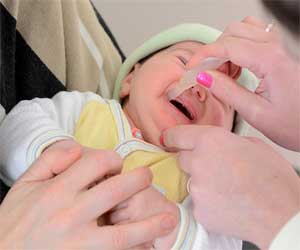- Home
- Editorial
- News
- Practice Guidelines
- Anesthesiology Guidelines
- Cancer Guidelines
- Cardiac Sciences Guidelines
- Critical Care Guidelines
- Dentistry Guidelines
- Dermatology Guidelines
- Diabetes and Endo Guidelines
- Diagnostics Guidelines
- ENT Guidelines
- Featured Practice Guidelines
- Gastroenterology Guidelines
- Geriatrics Guidelines
- Medicine Guidelines
- Nephrology Guidelines
- Neurosciences Guidelines
- Obs and Gynae Guidelines
- Ophthalmology Guidelines
- Orthopaedics Guidelines
- Paediatrics Guidelines
- Psychiatry Guidelines
- Pulmonology Guidelines
- Radiology Guidelines
- Surgery Guidelines
- Urology Guidelines
Rotavirus vaccination provides protection from type 1 diabetes: JAMA

Australia: Young kids receiving rotavirus vaccine are less likely to develop type 1 diabetes (T1D) compared with children not receiving this routine childhood vaccination, suggests a new study published in the journal JAMA Pediatrics.
Rotavirus can cause abdominal pain, fever, vomiting, and severe watery diarrhea. This can result in severe dehydration in children, requiring hospitalization to prevent fatalities. The rotavirus vaccine is routinely given to infants aged 2 and 4 months to protect them against a severe, potentially life-threatening form of diarrhea. Rotavirus infections are also thought to accelerate the development of T2D, although the exact reason for this association is not clear.
Kirsten Perrett, University of Melbourne, Parkville, Victoria, Australia, and colleagues investigated the number of Australian children diagnosed with T1D from 2000 to 2015 and found that type 1 diabetes diagnoses in children aged 0-4 years declined from 2007 -- the year that rotavirus vaccine was introduced as a routine infant vaccination.
Also Read: Serum Institute’s vaccine demonstrates significant efficacy against severe rotavirus
The incidence of T1D has increased steadily worldwide, since the 1980s, but the reason for this is poorly understood. Type 1 diabetes, a lifelong autoimmune condition results body's immune system destroys cells in the pancreas that produce insulin, a hormone that controls the level of glucose in the blood.
By investigating the number of Australian children diagnosed with type 1 diabetes each year since 2000, the research team observed that after 2007 the rate of type 1 diabetes decreased in children aged 0-4 years, said study lead Dr. Perrett.
Also Read: 9 out of 10 infants received vaccinations in 2017 : WHO Global Analysis
"The significant decrease in type 1 diabetes that we detected in young children after 2007 was not seen in older children aged 5-14. This suggests the young children could have been exposed to a protective factor that didn't impact older children," Dr. Perrett said.
"We observed the decline in the rate of type 1 diabetes in children born after 2007 coincided with the introduction of the oral rotavirus vaccine onto the Australian National Immunisation Program in 2007."
"Twenty years ago our team revealed an association between the appearance of immune markers of type 1 diabetes in children and rotavirus infection. Subsequent studies in laboratory models suggested rotavirus infection of pancreatic cells can trigger an immune attack against the insulin-producing cells -- similar to what occurs in type 1 diabetes," said study senior author professor Len Harrison from the Walter and Eliza Hall Institute.
"While not conclusive, our latest study suggests that preventing rotavirus infection in Australian infants by vaccination may also reduce their risk of type 1 diabetes. We will be continuing this research to look more closely at the correlation, by comparing the health records of young children with or without type 1 diabetes.
"At this stage we don't yet know whether the reduction in type 1 diabetes is a permanent effect or transient, and it may only be relevant to Australian children," Professor Harrison said.
For further reference log on to 10.1001/jamapediatrics.2018.4578

Disclaimer: This site is primarily intended for healthcare professionals. Any content/information on this website does not replace the advice of medical and/or health professionals and should not be construed as medical/diagnostic advice/endorsement or prescription. Use of this site is subject to our terms of use, privacy policy, advertisement policy. © 2020 Minerva Medical Treatment Pvt Ltd